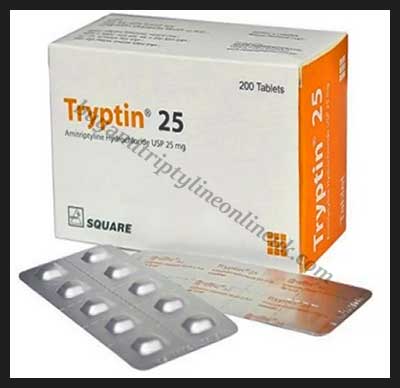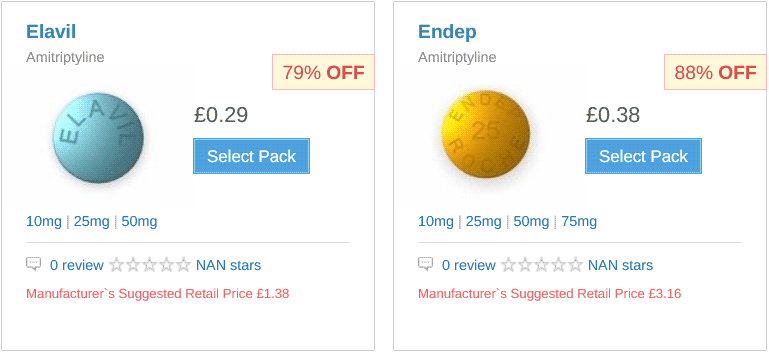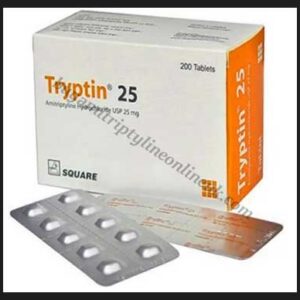Description
What is Tryptin?
Tryptin is a tricyclic antidepressant. It’s used to treat a variety of conditions, including fibromyalgia, chronic neuropathic pain, migraine, pain due to rheumatoid arthritis, and pain due to shingles. For most people, Tryptin is used to treat mild to moderate depression. Tryptin is also prescribed to relieve the pain associated with some chronic medical conditions, including migraines, fibromyalgia, nerve pain, and chronic pain caused by arthritis.
Tryptin belongs to a group of medications called tricyclic antidepressants (TCAs). It’s used to treat major depression as well as the pain and other symptoms of arthritis.
How do tricyclic antidepressants work?
Tricyclic antidepressants are believed to work by reducing the level of activity in the nervous system. Tricyclic antidepressants interfere with the way the brain normally regulates mood, sleep, and feelings of well-being.
Your doctor may prescribe Tryptin to treat pain in several ways, including:
- To relieve pain associated with fibromyalgia
- To relieve pain associated with arthritis and nerve pain
- To relieve chronic pain caused by shingles (herpes zoster) and other viral infections, such as hepatitis C, HIV, and multiple sclerosis
- To relieve chronic pain caused by headaches or migraines
Tryptin side effects
Many people who take Tryptin for a long time experience a series of unpleasant side effects. However, the side effects usually go away as the body becomes used to the medication. These side effects include:
- Anxiety
- Dry mouth
- Dry or constricted throat
- Dizziness or fainting
- Dry eyes
- Dry, itchy skin
- Flushing
- Headache
- Nausea or vomiting
- Night sweats
- Sensitivity to light
- Unusual movement of the eyes
How much do I take?
For general use, the initial daily dose when taken orally is 50-75 mg (25 mg in 2-3 doses), then the dose is gradually increased by 25-50 mg, until the desired antidepressant effect is obtained.
A dose of Tryptin varies by weight. You should always talk to your doctor before taking Tryptin to learn how much of the medication is right for you. Some people take as few as 10 milligrams per day, while others take as much as 200 milligrams per day.
If you’re concerned about having side effects or if you are concerned about the risk of a stroke, talk to your doctor. Many people take lower doses of Tryptin, at between 25 and 75 milligrams per day, for a shorter time.
How should I take Tryptin?
Your doctor may prescribe the following forms of Tryptin:
- Immediate-release tablets, capsules, or granules
- Extended-release tablets
- Transdermal patches
- Injection or infusion
- Sublingual tablets, tablets that dissolve under the tongue
- Extended-release capsules
The dose and how often you take Tryptin will be determined by your doctor. Depending on the condition you are treating, you may take Tryptin as often as once or twice a day, or only once or twice a week.
Talk to your doctor about the right dose for you.
Your doctor will start with a low dose, and slowly increase the dose until the best dose is determined. People respond to Tryptin in different ways, so your dose may need to be changed to treat your condition.
Taking Tryptin with food may help some people better tolerate the drug. It’s not known why, but food can increase the absorption of Tryptin, increasing the amount of the medication that reaches the bloodstream.
If you miss a dose of Tryptin, don’t take a double dose to make up for it.
Tryptin and pregnancy
There’s no reason to stop taking Tryptin during pregnancy, but it may cause you some trouble if you take it during your pregnancy. If you take Tryptin, you should be careful and avoid all known side effects of the drug.
Tryptin and breastfeeding
There are no known harmful effects of Tryptin on breastfeeding, and taking Tryptin while you are breastfeeding is unlikely to cause harm.
Is Tryptin right for me?
Tryptin is safe to take if you have chronic pain or other symptoms, such as chronic headaches or migraines.
Some people who take Tryptin experience side effects, but these side effects are usually very mild and go away as the body gets used to the drug.
For most people, Tryptin works well to relieve their symptoms. It may take a few weeks or months to find the right dose of Tryptin to treat your condition.
To find out whether Tryptin is the right treatment for you, talk to your doctor. If you are taking Tryptin and have side effects, talk to your doctor about whether to adjust the dose of Tryptin.
How do I get more information?
If you are having side effects while taking Tryptin, talk to your doctor. Talk to your doctor about how you can take Tryptin to manage your condition.



 English(UK)
English(UK)




